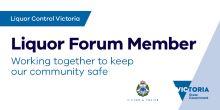Liquor forums
A liquor forum is a meeting between a local group of licensees, police, council and representatives from the liquor industry.
The group meets regularly to discuss and address issues of alcohol-related harm that affect their local area.
Read about joining your local liquor forum.
Liquor accords
A forum can work together to agree on any specific aims, actions, objectives and strategies for addressing local alcohol-related problems. It can formalise these in a document called a liquor accord.
A liquor accord document:
- is not required, so not all liquor forums have one
- must be approved by Victoria Police and Liquor Control Victoria.
Getting a liquor accord approved
Follow these steps to get a liquor accord document approved.
- Use our template to create your document or, if you create your own, include as a minimum:
- author, document version number, expiry date
- table of contents
- LCV accord banning guidelines (must be included)
- list of proposed members.
Get the local police licensing inspector to complete this statement:
I [name of the inspector] Licensing Inspector of [name of the police station] have read and approve the draft [name of the accord] Liquor Accord.
[Signature and contact details]- Email the statement and your draft accord document to lcv.education@justice.vic.gov.au.
- Allow up to 4 weeks for us to check your document and request changes or ask for more information.
- Once approved, we send you a confirmation email and copy of the approved accord.
These templates may also be useful when developing an accord:
Becoming an accord member
Once the document is approved, licensees can sign up to become a member of that liquor accord.
Accord members have the power to ban difficult customers from all venues who are accord members.
If licensees decide not to join as an accord member they:
- can still attend liquor forum meetings
- cannot participate in banning or receive information about banned customers.
Banning a customer
Members of a liquor accord may decide to ban a difficult customer from their venues.
The accord must only issue a ban:
- to minimise harm from the customer's behaviour
- if the behaviour occurred in and around licensed venues
- for no longer than 12 months.
It is against the law to use or disclose any information you have received about banned customers, except for the purpose of enforcing a liquor accord ban.
Updated

